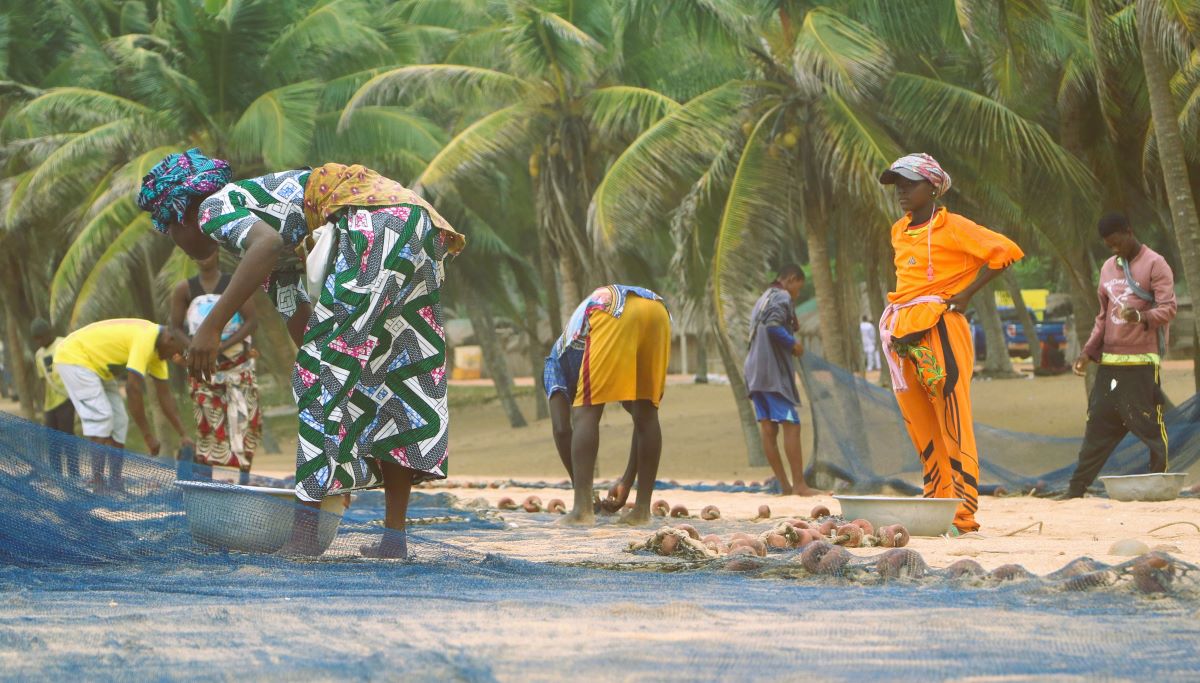From Grand Popo to Cotonou – In the heart of Benin, small-scale fisheries are a story of women, determination and community. From Grand Popo to Cotonou, women processors and fishmongers face challenges with courage, creating associative networks to overcome their obstacles. Let’s immerse ourselves in the daily lives of these women who are turning small-scale fisheries into a source of life and inspiration.
Under the hangar, lives woven of inspiration
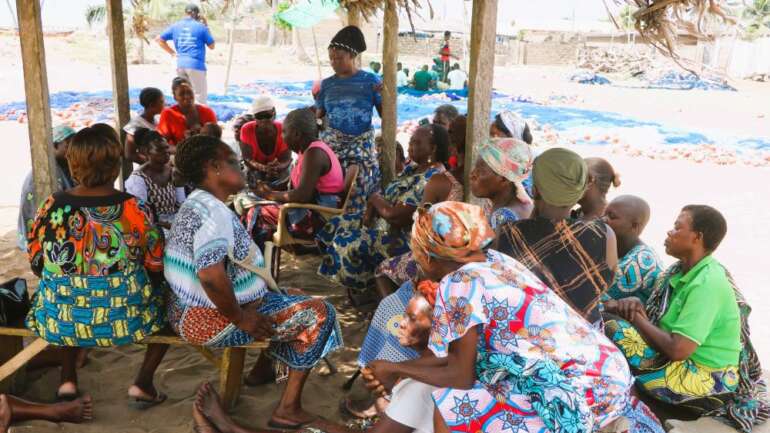
Under a shed drenched in the soft light of November 24, 2023, in the village of Agoué -Grand Popo-, some twenty women processors and fishmongers gather to exchange and share a part of their daily lives. The place, partially covered with coconut leaves, becomes the stage for the vibrant life that animates this community.
At 10:45 am, the benevolent sun doesn’t impose its heat, while the sea breeze caresses the faces of the women concentrating on their activities. The atmosphere is electric, charged with a collective energy that transcends daily tasks.
Some of women, seated around a long wooden bench, meticulously crush peanuts. The steady sound of the task punctuates the scene, a symphony of daily toil. Others sit on the fine sand, repairing fishing nets with a dexterity acquired over the years.
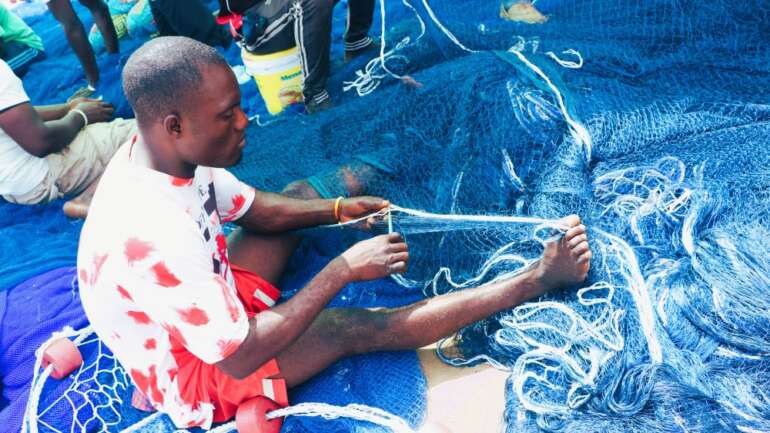
Meanwhile, in another shed, a group of men are meticulously making new fishing nets. The collaboration between men and women forms a harmonious dance, each gesture contributing to the intricate web of small-scale fishing in Grand Popo.
At the heart of this hive of activity emerges a sense of unity and determination. These women, bearers of an ancestral tradition, transform each day into a celebration of life and hard work. They do much more than process fish and shellfish.
The Association of Women Members of USCOFEP Benin
In the village of Agoué, the Association des Femmes Membres de l’USCOFEP Bénin is a living force. With 84 members dedicated to fish processing (smoked, salted, fresh), Ayina Fernande, Secretary General, guides this community towards success. Every Wednesday, they exchange and contribute 200 FCFA per person, enabling loans to members in need to buy fish.

According to the information provided, women in the Agoué community use firewood and coconut husks to smoke fish. This traditional smoking method gives the fish a distinctive aroma while ensuring its preservation.
Smoking with firewood and coconut husks is estimated to cost between 700 and 1,000 FCFA for the quarantine of nuts. This expense is an integral part of the fish processing process and contributes to the overall costs incurred by the Agoué women processors in their daily activities.
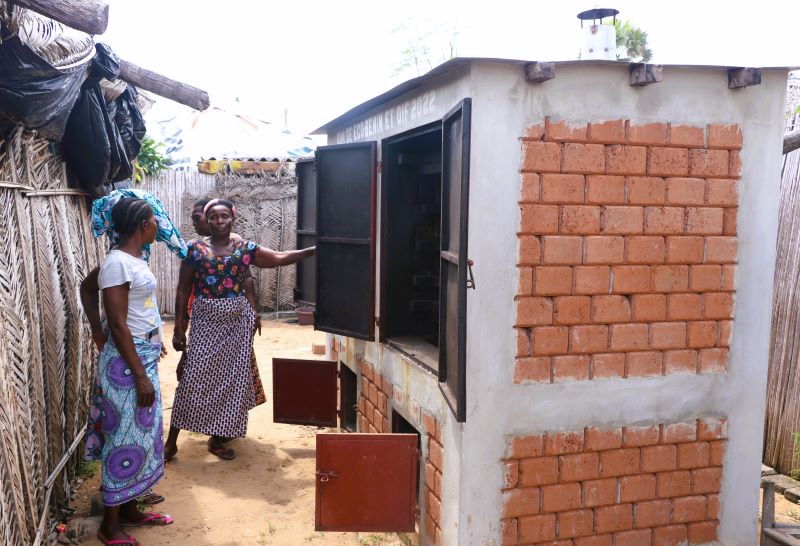
Eco-Bénin intervenes by providing fireplaces for the processing of fish products, offering training and contributing to awareness-raising. The association has been in existence for two years, receives ongoing training and has a bank account.
Sodji Hortence, president of the association, made a plea to the authorities and to all those of goodwill: “We are asking for technical support, including improved ovens, iceboxes, a cold room, solar fridges, and funds to buy fish products”.
Ayi Guinnou: Women’s Cooperative Society for Peace (SCOPEP)

In Ayi Guinnou, SCOPEP has brought together 60 women since its creation in July 2022. Contributing 1,000 CFA francs a month, they process fish products, sell fish and vegetables. A membership fee of 5,000 CFA francs guarantees commitment, and there are penalties for those who do not comply with the rules.
In addition to the challenges of selling products, market access and storage conditions, SCOPEP is faced with the scarcity of fish resources. They are organising the fair distribution of catches, but the impact is being felt with incomes that are sometimes insufficient. Individual market gardening is becoming a solution, making it possible to meet family needs, send children to school and provide health care.
The President, Gnamadi Marceline, and the General Secretary, Sandji Polline, expressed their need for technical support and training to strengthen their activities.
“We need training in organizational management, processing techniques and how to add value to fish products”.
Market Gardens and Fertile Lands

Within the SCOPEP in Ayi Guinnou, the practice of market gardening emerges as a clever response to the challenges faced by these women dedicated to artisanal fishing. With devotion, they cultivate products such as onions, carrots, beets, cabbage, chili, lettuce, and large morel. These lands, often rented at prices ranging between 15,000 and 30,000 FCFA, represent much more than a plot of land. These market gardens thus become the fertile extension of their determination, a way to weave a future nourished by the diversification of their activities and mastery of their destiny.
USCOFEP Benin: Briging together more than 200 women

With more than 200 active members over the past four years, the Cooperative Union of Fishing Women of Benin (USCOFEP) embodies transparency in income management. The president, Ms Anani Élisabeth, heads up this association, which offers a wide range of benefits, from information to mutual assistance, from training to support. Their weekly dues of 500 FCFA and monthly dues of 1,000 FCFA have built up a solid fund of 5,000,000 FCFA.
However, the challenges remain, with problems selling their products, mainly to individuals and restaurants. Women from USCOFEP Benin are asking for help, seeking financial support to overcome these obstacles. A solar-powered cold room and refrigerators are among their requests to improve their activities.
“We are facing problems selling our products. We have various varieties of fish products: preserved by ice, salted-dried, smoked, etc. It’s only by selling our products that we can make a profit. It’s by selling our products that we cover our family expenses and needs, and our children’s schooling. We processors and fishmongers spend more than our husbands.
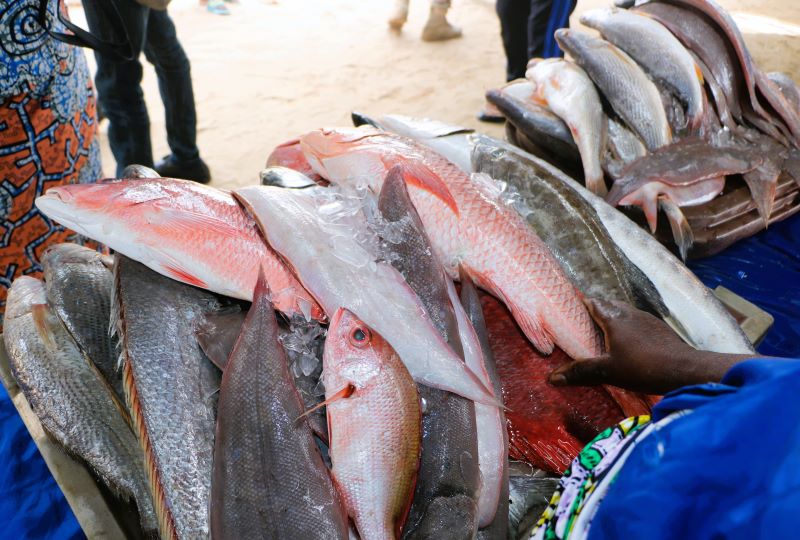
These women from Grand Popo and Cotonou illustrate the resilience of those involved in small-scale fisheries in Benin. Their stories show not only the significant contribution these women make to the local economy, but also their ability to pull together to overcome challenges. They are calling for more support, as their impact extends far beyond the Atlantic’s salty waters.
Mamadou Aliou DIALLO
Back from Benin


